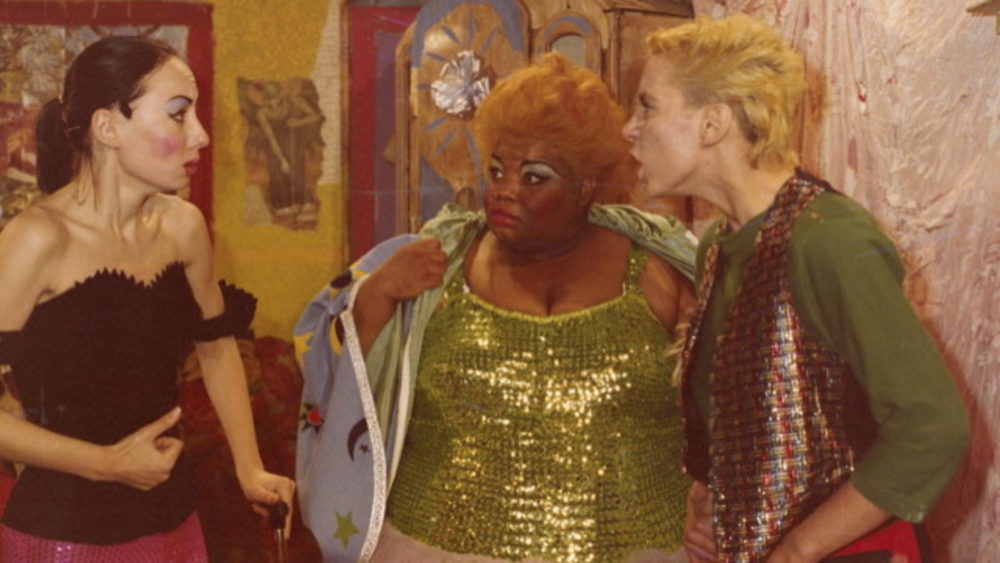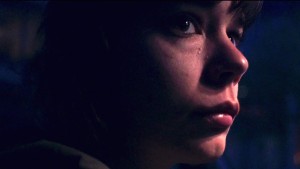
John Waters feels like an easy filmmaker to dismiss. As a man making films that deal in what’s been described for decades as deliberate bad taste, to just assume he makes films that are camp and trashy, their appeal built entirely on the idea of watching something that’s so bad it’s good. But this is overly simplistic, ignoring one of the common threads that runs through Waters’ films; a strong sense of the political, one of queer resistance to heterosexual society. This resistance, in some of Waters’ early work, particularly with Desperate Living, takes the form of anti-assimilation ideas.
John Waters’ films deal with outsiders. Even his more mainstream films like Hairspray are about people who fall outside societal norms. These outsiders are most aggressively against the mainstream in early films like Female Trouble and Desperate Living. In Female Trouble, Aunt Ida continually tries to convince her nephew to become gay. She says to him “queers are just better. I’d be so proud if you was a fag, with a nice beautician boyfriend. I’d never have to worry. […] I worry that you’ll work in an office, have children, celebrate wedding anniversaries. The world of heterosexuals is a sick and boring life.” This idea of a deliberate life outside of the heterosexual world may only exist in Female Trouble in this scene with Aunt Ida, but it shows a way into the political angle of Waters’ film, something that is shown in a much more sustained manner in Desperate Living.
Desperate Living opens in a style that feels like a trailer-trash Douglas Sirk, with a middle-class husband and wife living together in a nice, well-furnished and well-decorated house. But of course, the façade doesn’t last long, and Grizelda, the nurse who works for the Garvel family, kills Mr. Gravel. The two women go on the run and are excommunicated to Mortville, a place described by a cop as being “a special town for people like you two, people who should be so embarrassed by what they’ve done.”
Mortville is where things change, and where the idea of who is or isn’t an outsider gets turned on its head. Although Mortville is ruled over by the fascist Queen Carlotta, the citizens of this “special town” are all outsiders, members of marginalised communities who haven’t been able to find anything resembling home in the rest of the world. Peggy declares, with a regal air, that they “really hadn’t planned on coming here.” But Peggy is far away from her home in Baltimore, and quickly learns that, in a town like Mortville, populated by LGBT people, ex-cons, and those that society doesn’t care for, that she is the outsider.
When the characters reveal what led them all to Mortville, Mole McHenry says “it isn’t very pretty what a town without pity can do.” But Mortville, merciless though it is, isn’t the place that they’re referring to. The town without pity is Baltimore, the place that has caused all of these people to end up in Mortville, a place that only seems to exist for people that have no other place left to go. The problem for Peggy is that Mortville wasn’t made for people like her, and she can’t effortlessly belong there in the way that she could in the straight world of Baltimore. In a nightclub, Peggy says that she has “no desire to be a loose person.” But more than that, she’s acting in the exactly the same way that she did before arriving at Mortville, still relying on Grizelda for service, still assuming that her way of being is the norm, and that what she wants supersedes the wants of everyone around her. Grizelda begrudgingly agrees to walk Peggy home from the bar, but not before Peggy is told that she leeches and complains, and something’s wrong with her for not liking the strange, violent bar that everyone is in.
In a way, the character that Peggy is most similar to in Desperate Living is Queen Carlotta. Both women expect the world to bend to their will, although they exert this will in different ways; where Carlotta uses force and execution, Peggy acts under the assumption that Mortville is still her world and that her privilege allows her to get what she wants, forever trying to maintain her view of the world, even as houses literally crumble around her. Peggy takes work with Queen Carlotta, helping to spread rabies in the inhabitants of Mortville.
The climax of Desperate Living literally sees the outcasts storming the castle of Queen Carlotta, killing her soldiers, and eventually the queen herself. Amidst the things yelled at Queen Carlotta, she is told “you humiliated us for the last time.” Peggy herself, who tries to hide behind the veil of being a “sister” is also killed, but not before she says that “a single gunshot wound can’t stop the beauty of fascism.” The violent revolution at the end of Desperate Living has regime change at the end of it, a “great day of independence” that comes from the death of Mortville’s former ruler. The outsiders have created a society of their own, one where they can live free of humiliation, free from those that would do them harm. A city that is independent not only from Queen Carlotta, but from a wider society that has cast people aside. Queers who no longer need to live within the confines of a world that doesn’t want them, able instead to live outside of it, free and independent.
—
Directed by John Waters; written by John Waters; starring Liz Renay, Mink Stole, Edith Massey, Susan Lowe, Mary Vivian Pearce, and Jean Hill; 90 minutes.



 Derek
Derek
 Isabelle
Isabelle